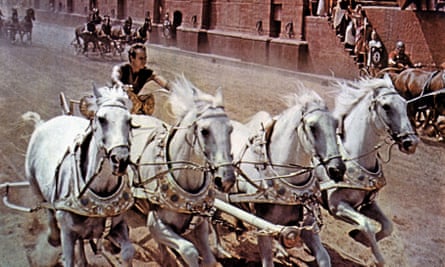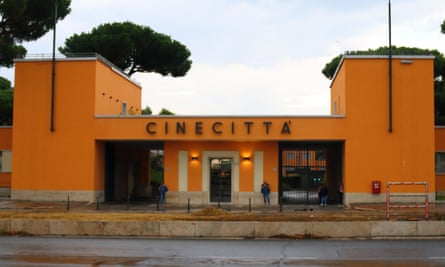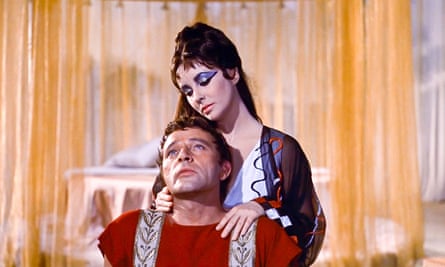Walk through the 1930s-built, dusty pink gates of Cinecittà, the legendary film studios in Rome, and the magic of its golden era is immediately palpable. This is where Charlton Heston rode to victory in his chariot race in Ben Hur, which went on to win 11 Oscars. It is where the real-life love affair between Elizabeth Taylor and Richard Burton played out on the set of Cleopatra, and where Federico Fellini produced classics including La Dolce Vita and Amarcord.
The sprawling Cinecittà was opened with great pomp by Benito Mussolini in 1937, in part to make films promoting the dictator’s fascist propaganda. During the second world war it was first occupied by the Nazis and later became a refuge to the thousands made homeless by the allied bombing of the Italian capital.
Then in the 1950s and 60s, with funds from the Marshall plan reviving battered European economies, Cinecittà rivalled Hollywood as US film companies flocked to Rome – so much so that the studios were nicknamed Hollywood on the Tiber.
Now, after decades of mixed fortunes, the stars are returning in earnest to Cinecittà, enabling the studios to recapture the essence of the glory days.
“People love to be here because they can do their job in a place where a lot of magic was created,” said Nicola Maccanico, the chief executive of Cinecittà. “This is one of the reasons why we were so fast in recovering our role in the audiovisual industry and the production environment. There are many film-makers who grew up and found their love for the movie business watching films by the likes of Fellini and Luchino Visconti, and so they can work where all that generation worked.”

In Studio 5, where Fellini made most of his films, craftspeople were putting the finishing touches to an amphitheatre that will feature in Those About to Die, a gladiator series by the German director Roland Emmerich starring Anthony Hopkins. Nearby, several studios have been transformed into 1920s Milan by the British director Joe Wright for M: Son of the Century, based on the bestselling novel of the same name by Antonio Scurati exploring Mussolini’s rise to power.
Cinecittà recently hosted Daniel Craig, who filmed scenes in a studio depicting the streets of 1940s Mexico for Queer, a romantic period drama by Luca Guadagnino.
The yet-to-be released Without Blood, directed by Angelina Jolie, and C’è Ancora Domani, a film debut by the Italian director Paola Cortellesi, have also been made at Cinecittà, as has Conclave, starring Ralph Fiennes, Stanley Tucci and Isabella Rossellini.
Maccanico has been in the role since 2021, when Italy’s then prime minister, Mario Draghi, held a press conference at Cinecittà with the European Commission president, Ursula von der Leyen, during which he announced the huge chunk of money coming to Italy via the EU’s post-pandemic recovery fund, a portion of which was earmarked for investment in the studios. In a similar vein to the postwar recovery, Draghi said: “At Cinecittà we are marking the dawn of the Italian recovery.”

Over the past two years, occupancy levels at Cinecittà have leaped from 30% to 80%, making the studios profitable again, according to Maccanico. This is partly due to the boom in production around the world, fuelled mainly by streaming services. A major lure, however, is Italy’s competitive tax incentive, which provides film-makers with a 40% rebate on production costs.
“In order to benefit from the tax credit you need to have a local partner,” Maccanico said. “It makes sense as the executive producers in the territory do the groundwork and bring the tax credit onboard.”
after newsletter promotion
Another strong appeal is Rome itself, which in the 50s and 60s was the epitome of la dolce vita, or the sweet life, and its extraordinary light, which adds particular value to films set in ancient times. “Ben Hur is one example but we also have ancient Rome in Those About to Die,” Maccanico said. “It’s not only about ancient Rome but real Rome light, which takes you back in time. International talents are also happy to spend time in Rome, so the combination of the two things [in attracting production] is powerful.”

Over its history, more than 3,000 films have been produced at Cinecittà, generating 90 Oscar nominations and 47 awards. In leaner times, the studios were mostly filled by Italian television series, including Big Brother. Still, there was always the odd film-maker helping to maintain the past glamour, such as Martin Scorsese, who shot Gangs of New York at the studios in 2002, and Mel Gibson, who made The Passion of the Christ in 2004.
“Even during the worst years for Cinecittà there were film-makers who decided to come here, but it was more of a celebration of the past for a single film-maker who would love the history of it,” Maccanico said.
To keep the momentum going at Cinecittà, which supplies jobs to more than 2,000 people and boosts local businesses, Maccanico plans to invest some of the Covid recovery funds in adding five new soundstages to the current 19. He is also striving to build more international partnerships to ensure the big productions keep coming.
“This is a place in which we are giving future opportunities to something that was created in the past,” he said. “Cinecittà is a symbol for Italy … in a small way, Cinecittà is demonstrating that Italy can be great again in places where it was over 50 years ago.”

